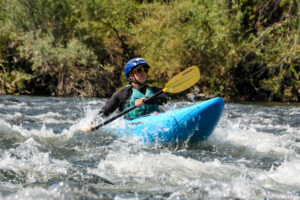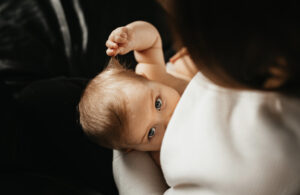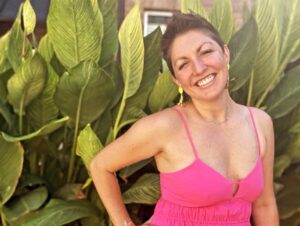Phone: 303.945.2490 Fax: 866.592.6911 Email: [email protected]
621 Kalamath St. Ste 175, Denver, CO 80204
JOIN US FOR A 2024 HEALING ADVENTURE!
October is National Breast Cancer Awareness Month, and First Descents wants to honor those in our community who have received a breast cancer diagnosis, which affects one out of every eight women and one out of every 833 men. We asked four program alumni to talk about their journeys, and we’ll be sharing their stories, advice and post-cancer thoughts with you throughout the month.
This week, Kaitlin DeMarcus shares her experience of receiving a breast cancer diagnosis postpartum, just eight months after she’d had her second child. DeMarcus, who earned her First Descents nickname “Swivel Jill” on an August 2023 kayaking program on the Rogue River in Oregon, lives in Anchorage, Alaska, which she says has felt a bit isolated as she navigates her treatments.
“There aren’t as many doctors here, and I definitely wasn’t finding other moms having my same experience,” Kaitlin explains. “It’s been hard just not having someone to talk to who understands what it’s been like.”

Kaitlin had been working at the University of Alaska Anchorage for a decade before her diagnosis, most recently serving as the director of a TRIO Upward Bound program, a college access initiative that seeks out students who are first in their generation to go to college. It was work that she found rewarding, but the cancer diagnosis and subsequent treatments and their complications forced her to stop working for the time being.
“But that meant I was able to jump on a First Descents trip once I felt up to it,” she says. “I was really excited to kayak, which scared the crap out of me, but really I was more afraid that I was going to be sad talking to other people with cancer. But I’m so glad I went, because it actually turned out to be a positive thing to talk to other people who’ve gone through similar experiences. It wasn’t a downer at all. It was really great to connect with people who knew what I was talking about.”
In February of 2022, I was 36 years old, and I’d just had a baby. So, I had an eight-month-old and a two-year-old. I started getting this pain in one of my breasts, and wow, it hurt every time I got bumped. I kept thinking it must be a breastfeeding thing, but the pain just would not stop. And it was not anything I had felt with my son, and so after a while, I started thinking I’d better start feeling around. And sure enough, I found a lump.
I instinctively knew it wasn’t breastfeeding-related, but I also hoped that maybe it was a blocked duct or something.
I called to get an appointment, and they said I needed to get an ultrasound and a mammogram, and the frustrating thing with this is that they will only let you book those together, so that delayed by weeks what openings they had. I showed up on the day of the appointments, but I came at the wrong time, I was late. I had missed it, and I was devastated, but one of my high school students was working the front desk, and I’m just sobbing, and thank heavens, they got me in the next day.
Well, once they took a look, all of a sudden, they had all these openings for follow-ups. They loaded the results in my portal, and the really hard thing was, I could log in and see that I had cancer, but no one had called me yet. It’s not a great system for people, that’s for sure. I couldn’t decipher what it meant, and so later a nurse finally calls me and talks me through it.
It was such a whirlwind from then on. In those first two weeks, it was so intense. I had to have a bone scan, they had to look at my heart, I had to find a surgeon and an oncologist. I look back on that and I’m like, oh my gosh, I have breast cancer, but it’s so hard to process that. I didn’t even know at the time that there were different kinds of breast cancer. I had no idea that it could already have spread.
It’s terrifying in the beginning to just wrap your head around what it all means. But what made mine more difficult was that I had to immediately wean my baby off breastfeeding. That was devastating. What made it worse was that they couldn’t get good images because my boobs were full of milk. Then after the images, I couldn’t feed her right away, not within 24 hours. It was rough. It’s a tough subject to begin with. A lot of people cannot relate, but my husband was great about it. I was calling lactation consultants, I was such a hot mess. The emotions and ripple effect of that, that was just so hard.
So, I was originally diagnosed with invasive ductal carcinoma, triple negative, Grade 3. They couldn’t give it an official stage until after surgery, so it was staged as 2B after my lumpectomy in August 2022 (after being diagnosed in February of 2022). The estimated size before any treatment was 4 cm by 4 cm. At surgery, the mass had shrunk to 10.5 mm at its biggest dimension – so it didn’t fully go away, but shrank substantially. They did not know of any lymph node involvement prior to surgery, but they wound up removing six lymph nodes – and one of the six was positive for micro-metastasis.
I did 16 rounds of chemo over six months; it was every week for a while. They wanted to shrink the tumor first, then I did the surgery, a lumpectomy. Then radiation. Now I’ve just started chemo again this week, the pill chemo two times a day, which I’ll take for six-ish months, to try and catch any cells that may have come loose.
Another factor I had to deal with: the anxiety of getting Covid. Can you believe I got COVID-19 two weeks after my last chemo dose? And two weeks before my surgery. I took Paxlovid, and then I was a rebound case for COVID.
But wait, there’s more! I also had to do immunotherapy alongside the chemo, but at the very first infusion, which was going to be every three weeks, at just two weeks in I started feeling intense aching in my bones. I woke up with the craziest rash you can imagine. It was in my ears, it was everywhere. Terrifying.
I tried all kinds of things to deal with all of these reactions. I was doing acupuncture, I changed my diet, I tried meditation. Nothing has worked. Then I had an even more horrible reaction, where a year ago I started losing my vision. Then my sinuses were totally closed off and I couldn’t breathe through my nose. Then my knee started hurting, and my back was swollen, and I was dealing with an 8-out-of-10 pain level every day. I could hardly walk. If I didn’t have kids, I’d have never gotten out of bed.
One thing I say to people all the time, I never trust a timeline anymore. I was told at the beginning, you should expect to deal with this for about a year, and here it is almost two years later, and I’m still dealing with this. I still can’t exercise, but at least my pain level is down to a one now. I was an athlete before and it’s so hard to be sedentary now.
Oh, for sure the people who would tell me, oh, I had an aunt who had this and she died. I mean, who thinks that’s helpful? It wasn’t; it stirred up my anxiety, and it was just hard to respond to. And of course there were people who say things like, I’m sure you’ve heard, you should not eat sugar. You should be drinking carrot juice. You should do this or that. And most of it is based on nothing real.
As for advice that actually helped, well, on my First Descents kayaking trip, they always had this philosophy: Look where you want to be going in the river, not where you’re trying to avoid. I have a lot of fear around whitewater, and I kept thinking, I don’t want to hit that rock, I don’t want to fall in there. But the guides kept saying, look at the part of the river where you’re trying to go, and you will naturally. And that turns out to be so relevant to this experience. Wherever you look, that’s where you’re going to go.
It’s really helped to shift my perspective. I tend to focus on the worst-case scenario – what could happen, what could go wrong? So now I know that’s what I want to avoid. I want to focus on what’s going to go right, where I want to be.
I feel so blessed! There are people who do this alone – they have no family, and might not have children or parents or anyone to help them, and so I’m so so so grateful for all the support we’ve had. Number one: Childcare. I don’t even know what I would do without my mom and her partner and my dad and his partner, and so many other family members. They all made sure we were covered for every single appointment. And here’s a silver lining: I get to see them all so much more now because they are supporting us through this.
One of my friends offered to come by and do our laundry every week, and at first, I was like, I do not want someone touching our dirty laundry. But my husband said, you know what, we’re just going to say yes. So I just had to let that go. I also had lived in a small rural community, the northernmost city in the U.S., and it’s such a tight-knit community – they did a huge auction to help us out, and so many people donated items. And so many people cooked for us.

Also, someone gave us money for family photos, which turned out to be an amazing gift. I had booked family photos in advance, just to capture the season of life we were in, and then I was diagnosed. I had to stop breastfeeding to start treatment, and that is, well, I don’t even know how to say how hard that was. It hurt so much, to let that go, and so the photographer captured these photos of me breastfeeding, which I just cherish. And then someone gave us this money to cover the cost of the photos, and it all just fell into place.
I just think really that the love that people have just poured into me has been one of the most healing things imaginable.
I made a lot of changes, which is another silver lining. I have to pour everything into this journey, and so I left my job, and that reduced my stress a lot, as hard as that was, but I think it was the right thing for my body. I’ve tried different dietary things; I had done keto for a while, but mostly now I just try to eat healthy. I also had put on postpartum and pandemic pounds, but I can’t be physically active with the complications, which had been the only way I know how to have a healthy body. I’ve definitely become focused on plant-based eating, but I don’t think I could be vegan. I think I’m still just trying to figure all of that out.
It’s hard to pick just one way. Learning how to surrender, for sure – that word has come up a lot for me. Letting go, trying not to control everything. Also, feeling that intense gratitude for everything. Never taking anything for granted. It has shifted my mindset in a really beautiful way, It sounds like a cliche, but I savor every smell and sound. Every moment with my kids. I just appreciate things so much in ways that I didn’t before.
